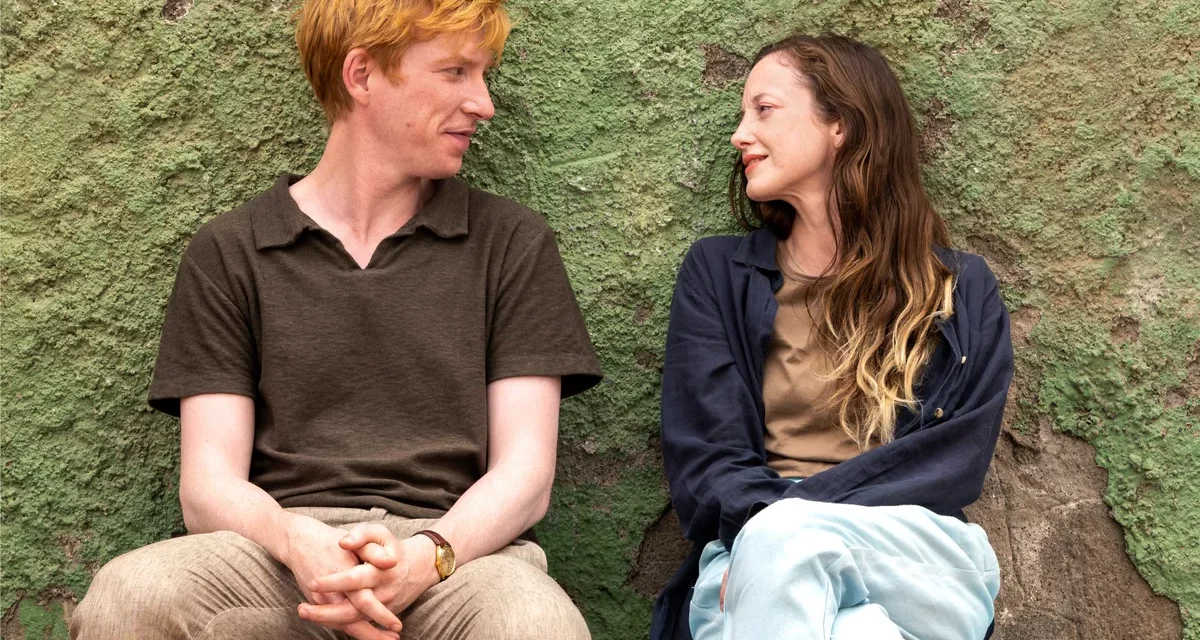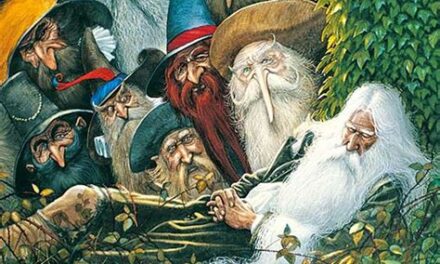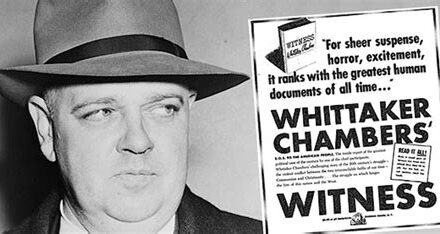Alice & Jack, a six-part drama that recently ended on PBS’s Masterpiece, certainly qualifies as an original. It chronicles a love affair between two people, the eponymous Alice (Andrea Riseborough) and Jack (Domhnall Gleeson), that begins in 2007 and ends, through a series of hops, skips, and jumps, in the present day—sixteen years by my hasty calculation. That alone does not make it anything new. Lovers in many stories have remained true to one another for long periods of fictional time in which they were sometimes together and sometimes not. Longfellow’s Evangeline is one of many examples. The real question about Alice & Jack is whether originality rises to real worth or sinks into mere novelty or, worse, silliness. (Beware: what follows is an extended spoiler.)
Jack meets Alice at a bar/restaurant through an online dating site. The audience learns quickly enough that Jack is involved in medical research in quest of cure a for Hashimoto’s disease, but Alice’s occupation remains a mystery. Is she a call girl? Apparently not, if not asking for money indicates anything. Yet their “date,” she admits, is not her first of this kind; otherwise, she reveals little else. Their evening together proves sufficiently satisfying to both that when she offers Jack a simple proposition, part and say goodbye or spend the night together at her apartment, he chooses the latter. That’s no shock in this jaded day and age, but their parting the next morning may take the viewer by surprise. When Jack suggests he call or text her, Alice says, “If it’s okay with you, I’d rather you didn’t.” This really feels like goodbye, leaving Jack to return to work perplexed and, as it happens, deeply in love. He won’t see her again for two years.
In the meantime, life goes on, and Jack soon begins a relationship with Lynn (Aisling Bea) whom he impregnates and dutifully marries. Now that he’s a husband and a father, he ought to settle down to a normal life, but he cannot forget Alice; more damaging, he admits as much to Lynn when she presses him on the delicate matter of his former love life. To make matters worse, Alice contacts Jack out of the blue and asks him to act as a pallbearer at her father’s funeral. He agrees but conceals it from Lynn. Once she discovers the truth, she declares their marriage a sham and eventually divorces Jack. Alice is nowhere in sight.
A few more years pass, and, as surprisingly as before, Alice contacts Jack with a new request. Will he give her away at her wedding? That takes a lot of gall and a lot of cajoling, but Jack, once his anger subsides, surrenders and heads to a plush hotel for the big event. Embarrassingly, the jolly guests at the pre-wedding dinner persuade Jack to make a speech honoring the happy couple, which he handles with a shy grace. What should the groom, Mark (Ben Dilloway), look for in Alice, he asks the gathering: Expect the unexpected. But, he adds, Mark won’t regret it.
The next morning the unexpected has happened. As Jack leaves his room, Mark angrily passes him and says very little. Does he have some regrets? Clearly, something is amiss, and the something in Alice who has disappeared, leaving no one in doubt that the nuptials are kaput. However, she has left Jack a simple note: We will meet again. One may assume that Jack’s presence has effectively cancelled her love for the man she was supposed to marry.
A couple of years elapse in Jack’s life before Alice re-emerges. This time she comes bearing gifts and not like a Greek. As it turns out, prostitution was never her calling. She’s involved in stock and commodities trading, and she has a surefire plan to make Jack rich beyond his wildest dreams. Predictably, he listens in disbelief—he is, after all, none too pleased to see her after the last escapade—but she tells him not only to take his savings (those, mind you, of a medical researcher) and any money he can borrow and sink every last dime into whatever she’s peddling. As always, Alice carries the day, telling Jack not to sell until she gives the word. He agrees and, lo and behold, becomes a multi-millionaire as, indeed, does Alice. More than that, she goes behind his back and endows a research department in his company with Jack as head. After which she disappears yet again.
Apparently, the two meet without plan or warning in Cuba where each has gone on business. Although we don’t view it until later in flashback, the blue skies, shimmering seas, and cool breezes constitute a virtual paradise, Shangi-la in Castroland. When they meet again, as usual, years have elapsed; Alice announces that she wants a child and has scheduled artificial insemination. Will Jack kindly be with her when the procedure takes place? Yes, he will. Once the two are together in the presence of a nurse, they ask for some privacy, the nurse obliges them, and within minutes the artificial insemination becomes boisterously real. After this rather spontaneous but almost certainly desired event, Alice doesn’t leave.
But all is not well. Alice and Jack learn she is pregnant; however, early testing reveals a cancer—not the baby’s but hers. When Jack heads home in a taxi (he never drives himself anywhere, preferring to bicycle), he has an alarming seizure. An examination reveals he has Ehlers-Danlos Syndrome and, if he wants to live a long life, must put as little pressure on himself as possible. It all sounds like a double helping of Erich Segal’s Love Story with both “lovers” stricken with disease. Anyhow, Alice’s condition worsens, sending her to the hospital to await the end. Of course, Jack sits in her room, before long snuggling up to her in bed, waiting for the inevitable. When he wakes in the morning, he finds her breathing has stopped, with nothing for him to do but spend a few hours with the corpse and then go out to a bench on the hospital’s grounds and die.
As I said earlier, Alice & Jack can lay claim to originality, even quirkiness. But does it enlighten its audience about the nature of love as its creators surely intended it should? Except for the last episode, I might have said no. That episode, especially four events in it, cast light on the preceding installments in a manner that modified the negative judgment.
First, it shows the past meeting in Cuba in all its romantic glory. Later, in present time, as Alice’s condition declines, Jack and she meet in a park for a drink, where she reminds him of a question she asked him when they first met: Does he believe in an afterlife? He didn’t answer then. Now, he responds by asking her if she’s becoming religious. She quickly says no, but just as rapidly changes her mind, stating that although there’s no way of proving it, she sees “hints,” mainly in the love they have for one another. Then, on her deathbed, he declares, “You’re my calling, you’re what I believe in; the rest of it just doesn’t matter.” It’s a poor substitute for orthodox faith, but in the world of Alice & Jack, that’s about as close as one gets. Finally, when both Alice and Jack have died, Jack’s daughter, Celia (Millie Ashford), goes through Jack’s belongings, and finds the note from years before, “We will meet again.”














